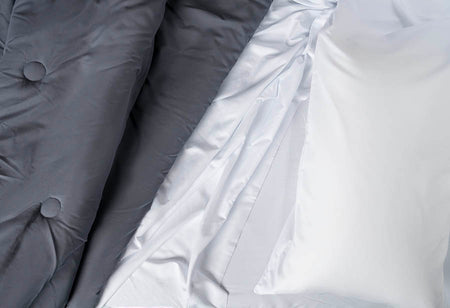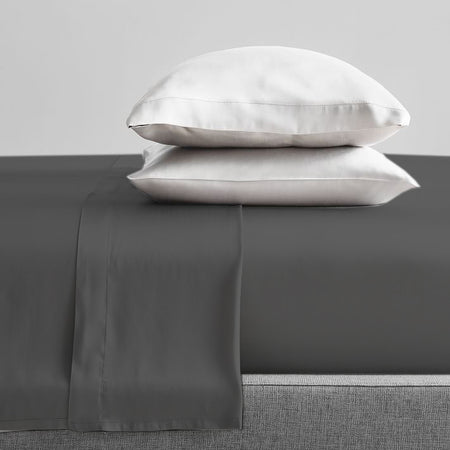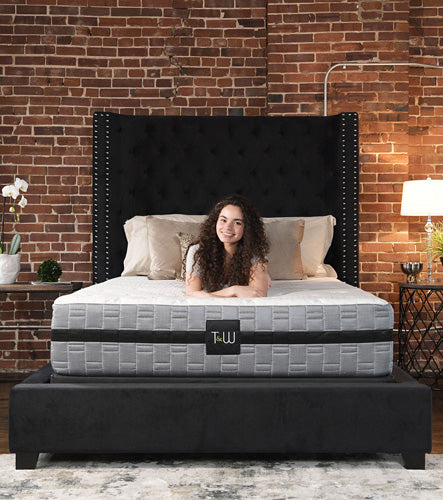The first years of life are crucial to child development. And we're learning so much about how vital sleep is to brain development. There has been a lot of research into how to help your kids sleep better at night, and the scientific community is consistently learning new things.
A research team led by Dr. Ze Wang at the University of Maryland conducted a study that involved nearly 12,000 volunteers between 9 and 10 years of age from across the country. Their research compared children who typically got less than the recommended nine hours of sleep to children who generally got nine or more hours of sleep per day. The study was conducted over a two-year period, and both groups were matched according to key factors like gender, household income, body mass index, and puberty status.
According to Dr. Wang, "Children who had insufficient sleep–less than nine hours per night–at the beginning of the study had less grey matter or smaller volume in certain areas of the brain responsible for paying attention, memory, and inhibition control, compared to those with healthy sleep habits." Dr. Wang went further, "These differences persisted after two years, a concerning finding that suggests long-term harm for those who do not get enough sleep."

It's never too early to promote enough quality sleep for our children. As other studies confirm, very early brain development is crucial.
Health Issues and School-Age Children
UH Rainbow pediatric sleep specialist Carol Rosen, MD. explains, "Sleep helps us solve problems, react quickly, form memories, and learn. Inadequate sleep affects how well kids do in school. It also impacts a child's physical well-being. The body releases hormones during sleep that aid growth, build muscles, and repair cells and tissues."
A study conducted at another children hospital suggests that not enough sleep or poor quality sleep contributes to major health problems, like obesity.
Sleep Disorders Like Sleep Apnea
Some young children can develop sleep disorders like pediatric obstructive sleep apnea, according to the Mayo Clinic. This is not limited to children who are obese. The occasional night terror or a restless night does not constitute sleep deprivation. However, it's always good to keep track of your children's sleep schedule.

What Parents Can Do to Promote a Good Night's Sleep
Establish a Sleep Routine: Habits, be they good or bad, can take 21 days to form. (In my humble opinion, bad habits take root in the flick of an eye, while good habits take forever.) In any case, establishing a consistent bedtime is always a good idea.
Wind Things Down: If we can limit high-energy behaviors as bedtime approaches, it will make it easier for our children to want to get ready for bed.
Start Early: Some parents have found that having their children brush their teeth and get into pajamas well before bedtime can make things calmer when it's finally bedtime.
Eliminate Electronics: This is a tough one to enforce, but the payoff is worth it. Allowing children to take their smart devices to bed with them will disrupt their sleep. Not only can these devices stimulate them, but the blue light that emits from the screen has been shown to make sleep more difficult. Biologically, blue light signals our bodies to wake up just like the morning sunshine.
Mellow and Warm Room Lighting: The right kind of dim lighting can help promote quality sleep. A bright overhead light source with a high Kelvin rating will tend to keep your kids awake longer. Look for light sources that provide indirect lighting with a warm glow rather than "daylight" type light sources.
The Right Kind of Bed: Sure, our kids can fall asleep anywhere, but why start things off on the wrong foot? A proper mattress and bed don't have to be expensive or fancy. First, get the basics right, like the type of materials used and the amount of support. Then, if you can, look into some of the options that can help your child get a good night's sleep.

Memory foam mattresses and hybrid mattresses offer some unique advantages. To learn more about this, seek out some expert advice from a well-established retail outlet that's local. Bring your children along and ask them to be a part of the decision-making process. This can encourage them to regard the whole topic of sleep more importantly.
What and When Your Child Eats
The earlier you can start to establish some guidelines for what your child eats and when they eat it, the better off they'll be. When they're babies, it's all about when and how much. The parenting of infants and toddlers is dominated by food intake (and output, so to speak). But as our children grow up and become more independent, it's not as easy to keep track.
According to one study, high-protein and high-fat food can disrupt sleep. These types of food take more time for the body to digest, and if eaten too late in the day, it can make it more difficult to fall asleep and stay asleep during the night.
Chemicals like tyramine and norepinephrine found in childhood favorites like processed cheese and pepperoni may taste great to our children, but they are known to stimulate the brain. When eaten too late in the day, these foods can make it difficult to get enough good quality sleep.

Getting Enough Sunlight for Vitamin D
Not too long ago, children got more than 13 hours of sunlight every single day. Lately, as our children spend more time inside playing video games, getting enough sunlight is a challenge. Sunlight helps boost our bodies' vitamin D levels, and this is important to our ability to regulate our immune systems in order to fight off infections.
Enough Exercise is Important
Exercise, exercise, exercise. It's impossible not to hear about the benefits of exercise to our species. The trouble is, the more "advanced" we get, the tougher it is to remind ourselves to get enough exercise. Exercise is even more important for the developing minds and bodies of our children.
In one study cited in Medical News Today, research has shown a "direct connection" between poor sleep patterns and lack of exercise. Children who were physically active during the day fell asleep more rapidly than other less active children. The more strenuous the activity, the more quickly they fell asleep. It's even better when this physical activity takes place outdoors in the sunshine.






















